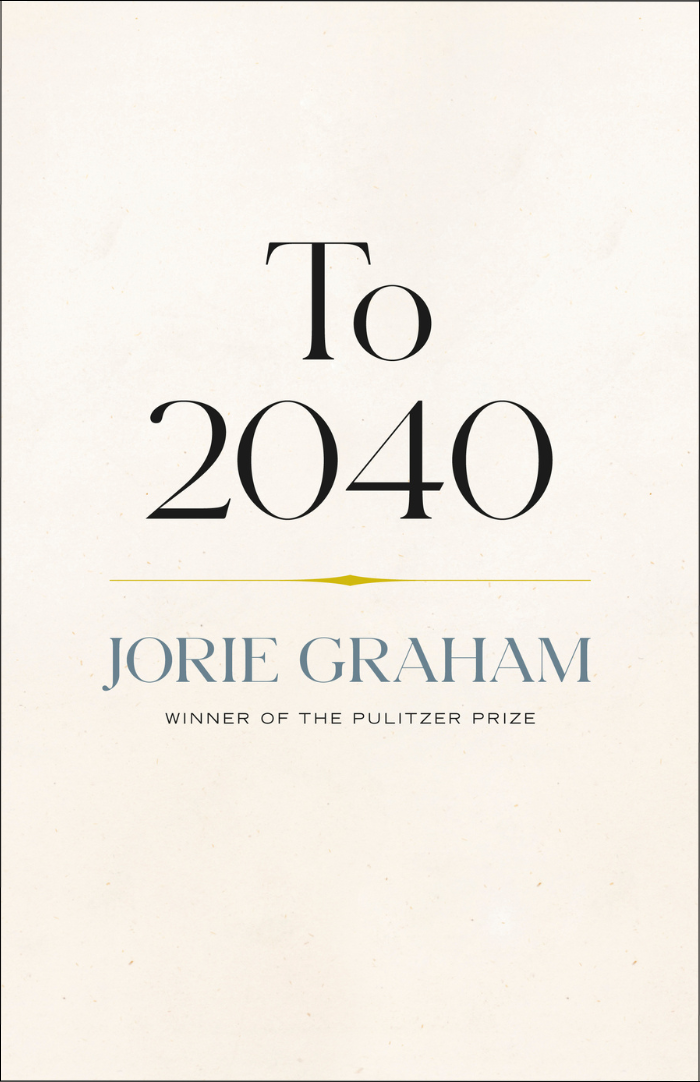
It is rare to find in one collection an entire skyline burning and the quiet to follow a single worm, to hear soil breathe—in Jorie Graham’s fifteenth poetry collection, you do. Jorie Graham’s fifteenth poetry collection, To 2040, opens in question punctuated as fact: “Are we / extinct yet. Who owns / the map.” In these visionary new poems, Graham is part historian, part cartographer as she plots an apocalyptic world where rain must be translated, silence sings louder than speech, and wired birds parrot recordings of their extinct ancestors. In one poem, the speaker is warned by a clairvoyant “the American experiment will end in 2030.” Graham shows us our potentially inevitable future soundtracked by sirens among industrial ruins, contemplating the loss of those who inhabited and named them.
In sparse lines that move with cinematic precision, these poems pan from overhead views of reshaped shorelines to close-ups of a worm burrowing through earth. Here, we linger, climate crisis on hold, as Graham asks us to sit silently, to hear soil breathe. An urgent open letter to the future, with a habit of looking back, To 2040 is narrated by a speaker who reflects on her own mortality—in the glass window of a radiotherapy room, in the first “claw full of hair” placed gently on a green shower ledge. In poems that look to 2040 as both future and event-horizon, we leave the collection warned, infinitely wiser, and yet more attentively on edge. “Inhale. / Are you still there / the sun says to me.” And, from the title poem, “what was yr message, what were u meant to / pass on?”
ISBN: 9781556596773
Format: Hardcover
Reviews
2024 Pulitzer Prize Finalist
2024 Griffin Poetry Prize Shortlist
“A fluent yet spare volume about grief, loss, and vulnerability, through an array of themes including environmental disaster and personal mortality.”—Pulitzer Prize Finalist Citation
“’How do I/ find sufficient// ignorance. How do I// not summarize/ anything,’ Graham writes in the first pages of her coruscating new work, then proceeds to show readers how to look with pitiless honesty at a damaged world, now and in the future, as even rocks burn, winds stir, and the end nears. A wondrously unsettling read.”—Barbara Hoffert, Library Journal, Best Poetry of 2023
“Most notable of the many collections rooted in ecology . . . driven by a skittish yet visionary energy that makes an apocalyptic future feel cinematically thrilling, frightening and all too plausible.”—Guardian
“Her latest collection, To 2040, is the culmination of a long career exploring humanity and the environment. Amid much despair, there is hope, too.”—Carol Muske-Dukes, Washington Post
“With a characteristically unflinching eye and formally innovative approach, Graham contemplates extinction and the apocalyptic circumstances of the climate catastrophe. These poems inventively and hauntingly conjure future landscapes, sights, and sounds, offering a gripping and urgent reminder of the future that might await humanity if more isn’t done to change course.”—Publishers Weekly, Best Books of 2023
“An urgent, vivacious book based in stark reality but written with craft and beauty.”—Financial Times
“Pulitzer Prize winner Graham’s 15th collection is perhaps her finest and most profound work yet, revealing such astonishing individuality in the idiosyncratic, elliptical style she has perfected over more than 40 years that fellow poets may feel tempted to throw up their hands in despair. This is a poetry of passionate intensity and conviction that reverberates with an astonishing and almost spiritual transcendence. . . . Since the death of A.R. Ammons, no U.S. poet has demanded so much of her reader or offered so rich and mysterious a reward. Here we are reminded not of Eliot or Yeats but of Habakkuk, Hosea, and especially that voice from the end of Job that cries out, ‘Gird up your loins man, and I will question you….’ VERDICT A masterpiece that belongs in every library where poetry is found.”—Library Journal, starred review
“This is a rare gift: an ardent and pitiless anthem to a crazed, razed world.”—Publishers Weekly, starred review
“These gorgeous, dismaying, and piercing cautionary lyrics are tragic dispatches from a grim possible future spawned by our distraction and hunger for the wrong things. Clarion and virtuoso, Graham prods, ‘are you not listening.’ These poems must be heard.”—Booklist
“For more than four decades, Jorie Graham’s poetry has documented the complicated, multidimensional, ever more uncertain sallies of human perception into the bristling presence of trees, birds, streams. . . . The urgency of the poet as messenger animates Graham’s new collection, To 2040, her tenth since winning the Pulitzer Prize in 1996. Its poems address the demise of the world—the vase of blossoms on the table, the tree from which they came, even the human mind attending to them—which has provided poetry with so much of its material and its source of power. Imagine, they say to the desolate future, how this world once existed, how we once lived alongside other species. They exhort us, her readers in the present, to ‘look behind you, turn, look down as much as you can, notice all / that disappears.’”—The Atlantic
“In the face of a global climate crisis, can you delay the inevitable? Pulitzer Prize winner Jorie Graham’s new collection is both a call to action and an existential glance at the potential fate of the world.”—Electric Lit
In what might be humanity’s final hours, Jorie Graham’s recent poetry offers an elegiac grace for our species. What I’ve always treasured in Graham—how she registers her mind’s acrobatic detours and excursions on the page, rendering this for her readers—is still here, but her latest books are possibly more momentous, reflecting her concerns about climate disasters, extinction, and the increasing disembodiment resulting from our headlong technological expansion.—Jessica Reed, Annulet Poetics
“Where Jorie Graham’s To 2040 happens cannot be any place but now. . . . Graham needs the technology of poetry to make immediacy happen; the sentences of To 2040 contract and expand through degrees of extremity—a poem made from terse declaratives, another poem made from only sentence fragments, another a single sentence—to affect a mind not merely working through these problems, ideas, feelings, but to pattern a mind being here, now.”—Christian Wessels, Cleveland Review of Books
“Climate catastrophe is the subject of many of these poems; it’s an omnipresent groundswell elsewhere, but Graham’s particular achievement here is to find a form to evoke this anxiety and to underscore the scale of the emergency. These poems seem to offer us glimpses of two worlds: one doomed; one just about redeemable.”—Irish Times
“In Jorie Graham’s hands, form is a kind of method acting, an inspiriting habitation. Breath, more than ever, is momentum in her new book, To 2040. As always in Graham’s oeuvre, the lyric explodes experience, stretches time—seems to—expanding the line’s possibilities, whether in short or long lines. To 2040 can seem both an address, an intimate but public apostrophe to a year that’s not so far away, and the title can also suggest a movement toward that year, a movement that might be fatal.”—McSweeney’s
“A Jorie Graham poem is a deep burrow into a position from which one can gather nothing but the sense of being terribly alive. It is a nakedness from which story will not appear to save you. There are many writers with righteous self-assurance, and many comfortable with bewilderment, and they are only rarely the same people. It is Graham’s unearthly self-possession in the presence of mystery that renders her poetry so strange.”—New York Magazine
“To 2040 is a powerful attempt to fathom a scale of destruction we don’t yet know how to feel, let alone mourn.”—4Columns
“One of her best books yet. . . . Graham reinvents Wallace Stevens’s legacy of radiant philosophical verse as she seeks to discover how thought and language might throw off their human biases and move into spaces of liberating environmental openness. . . . A profound engagement with how our thinking about nature might change, and transform us in the process.”—The Guardian
“Curious in its approach to tradition, courageous in its vision of death and the afterlife, To 2040 deserves recognition with major acclaim in the coming year, not necessarily as the capstone of a career but as a singular and arresting engagement with mortality—neither should we, in other words, avert our eyes.”—Christopher Kempf, Preposition
“Like all strong poetry, Graham’s is deeply attentive to questions of structure, but equally committed to emergence and discovery. Throughout her writing, even from its earliest days, a scrupulous discernment can be sensed in the arrangement of words on the level of the phrase, the line, the sentence, the strophe, the page, the poem, and the book, but with a gale-force activity of the mind always countervailing her own architecture, like tendrils of an unstoppable vine nearly overtaking the trellis. If the radical interplay of these principles is what generates in Graham’s poetry an almost relentless intensity, it is also what makes it so reliably inviting, calling out to the reader with assurances that the stairs are steep, but the banister is sturdy, or that the road is wild, but wheels won’t fly off.” —Timothy Donnelly, Lana Turner
“The great American poet summons frightening visions of post-apocalyptic futures, in a book where personal and planet-wide concerns collide.” —Telegraph
